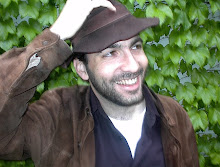Conflict and action aren't really hard -- at least, I don't think they're hard. 1. Conflict people seem to understand. They may avoid it, even in some theater god love'em, but they know what it is. 2. Action can be almost anything from blowing up a building to lifting a finger.
No play has to do any number of these things to any particular degree. I simply believe they have to be there somewhere, and they are the basic building blocks of all drama.
Character and context are where the current theater falls down or rises up. So many creative artists seem to care more about ideas and arguments then people. Therefore the characters are only developed enough to support the ideas or arguments. They are inflexible and unreal. In fact, context and character must inform each other. While I wrote that character comes first in the last post -- because people and compassion must come first -- but characters are shaped by the context in which they live. So, you can't simply say "Joe wants x and is afraid of y" and believe you've defined your character. Character and context, and action too, keep doubling back on each other to change each other and the story. When you're married to much to an inanimate object (like an idea) then your characters never really live and/or they never feel like they inhabit a real world.
Some plays I see either have the outline of characters in service to an idea or they have hyper-specific characters that don't exist in a living, breathing world that matters to them. They are inviolate people who could be plucked down in 1970s Soviet Russia and have the same domestic drama problems they have in the present time. I don't mean same as in universal -- I mean the same as in exactly the same -- nothing outside the concept of this character has any effect on their personality, behavior, or beliefs. At best, there is an obvious, unrealistic cause and effect relationship like "Because my mother divorced my father, I changed from a sweet little boy to a sarcastic little boy." It's clear, I suppose, but also dead. And false. And therefore dead.
Depending on the story and the effect you want to have on the audience, structure follows from context and character. Simply, if a character is a bit whacked out and you want the audience to experience that perspective, you might structure the play's dialogue or timeframe or whatever a little more whacked out. . . That example is way over simplified but you get the point.
The basics. More to come.
Subscribe to:
Post Comments (Atom)

No comments:
Post a Comment